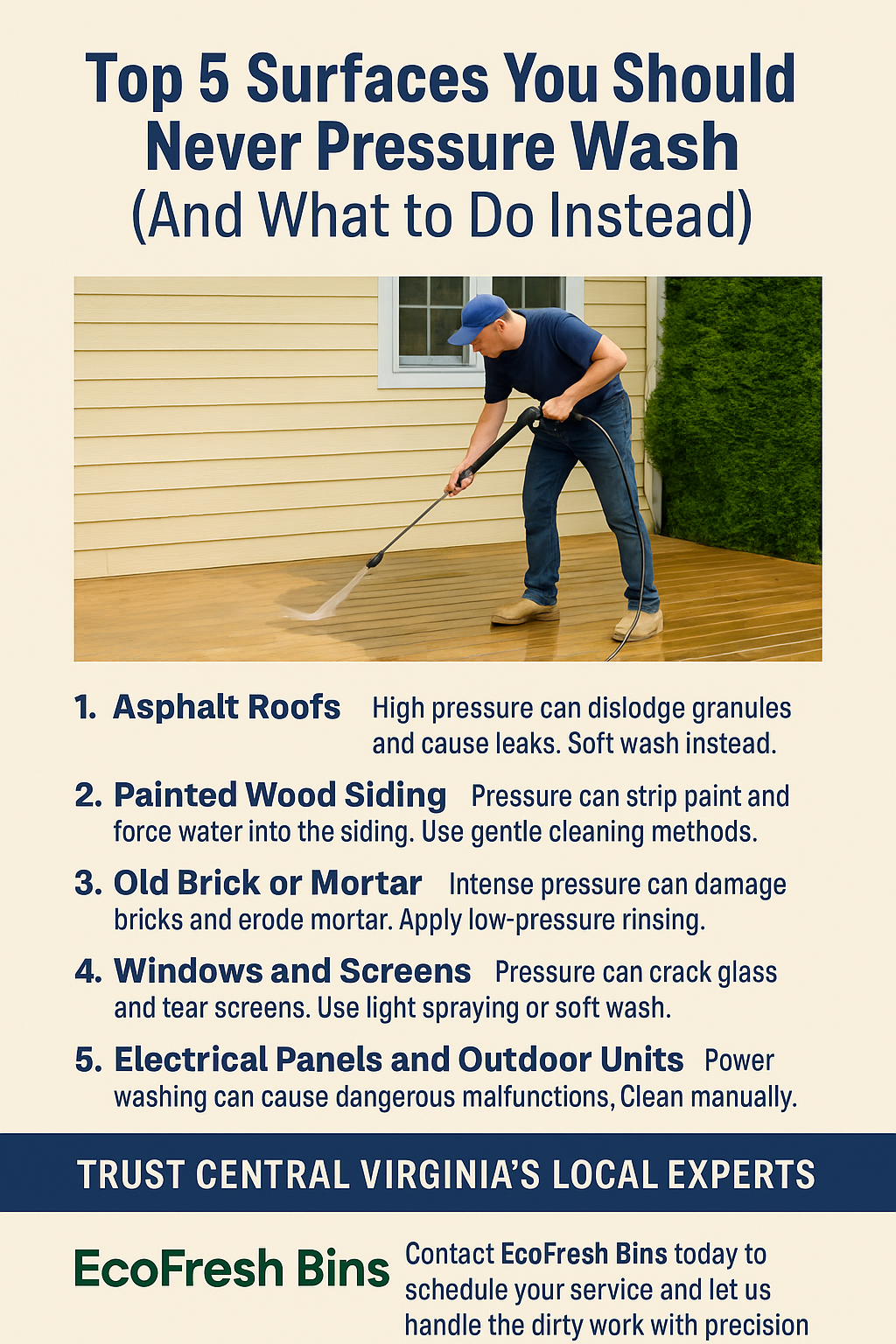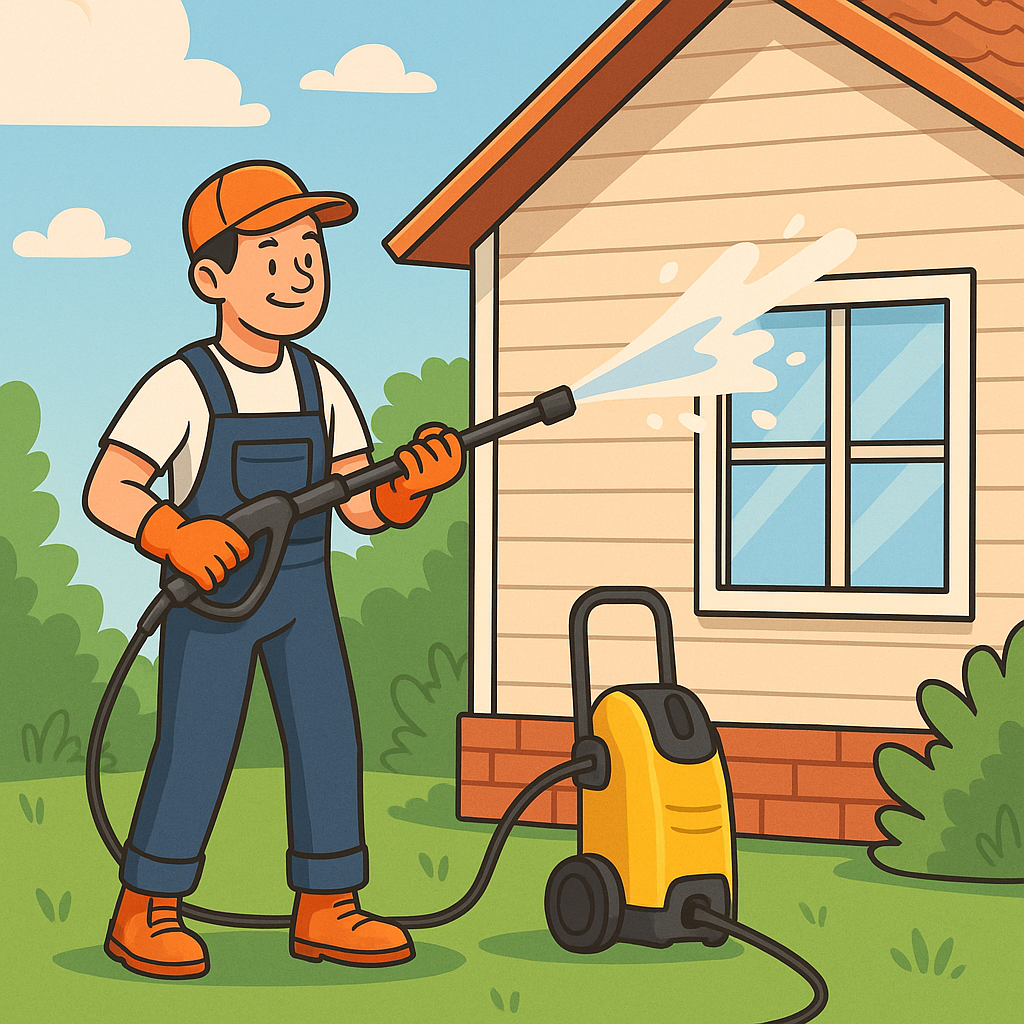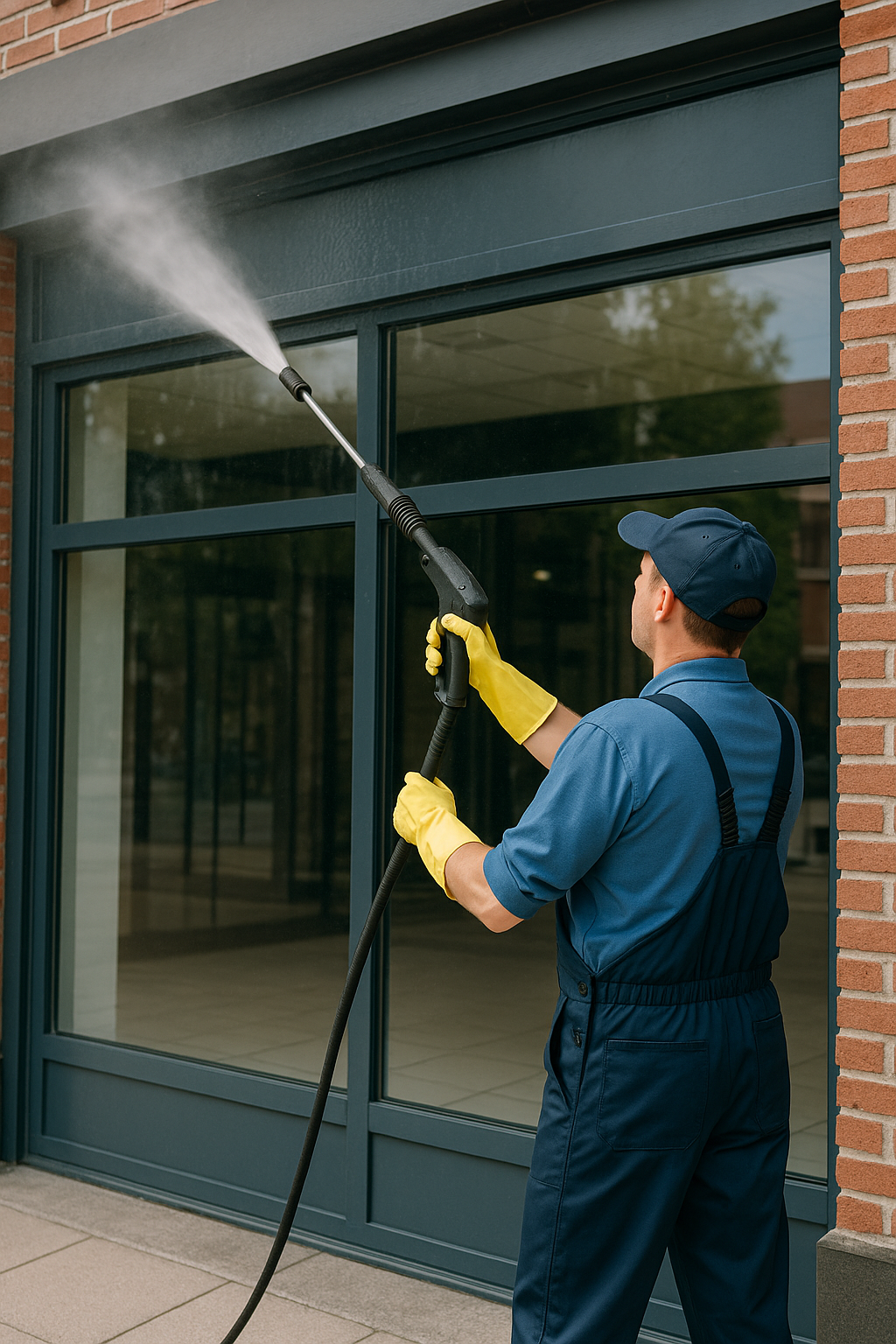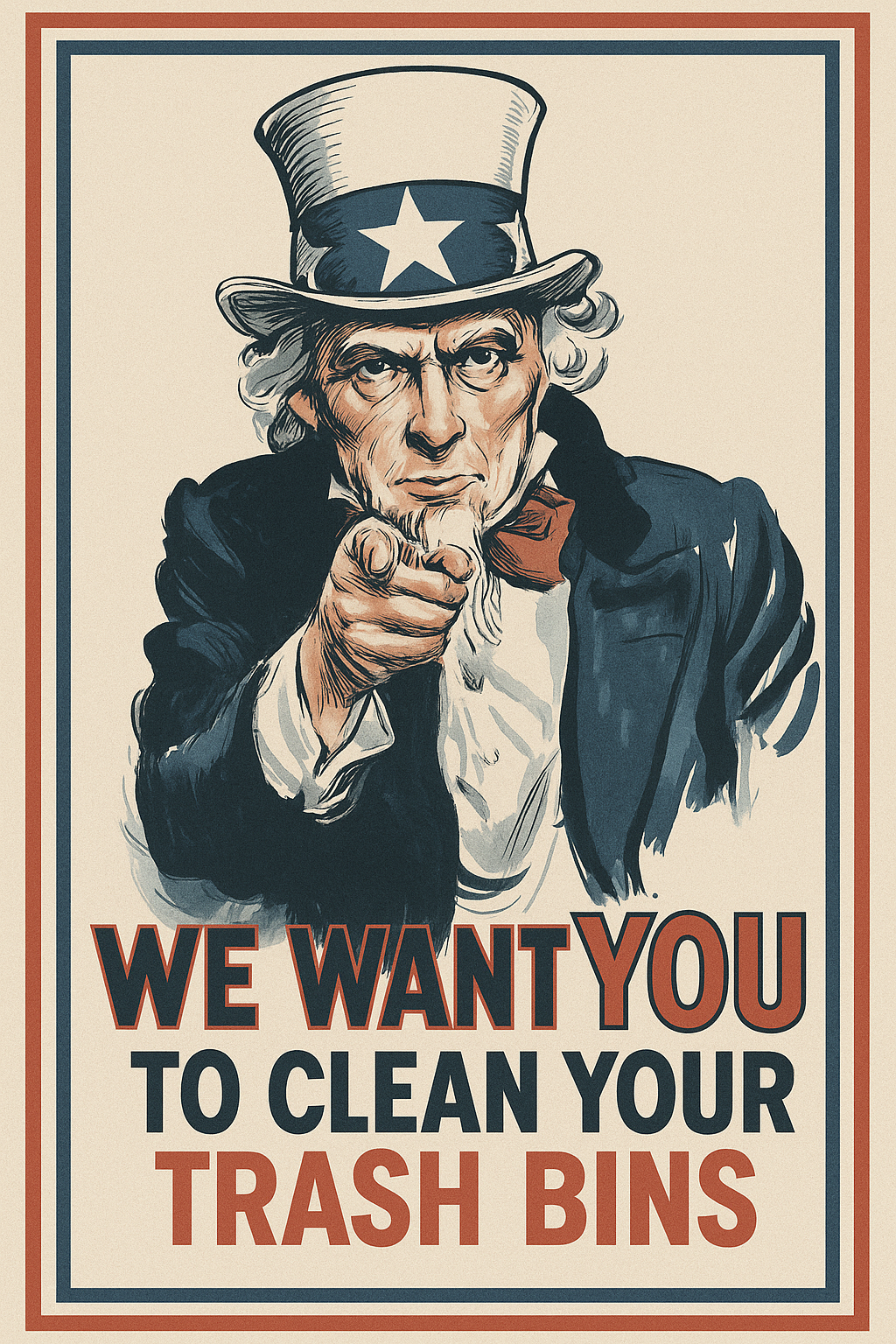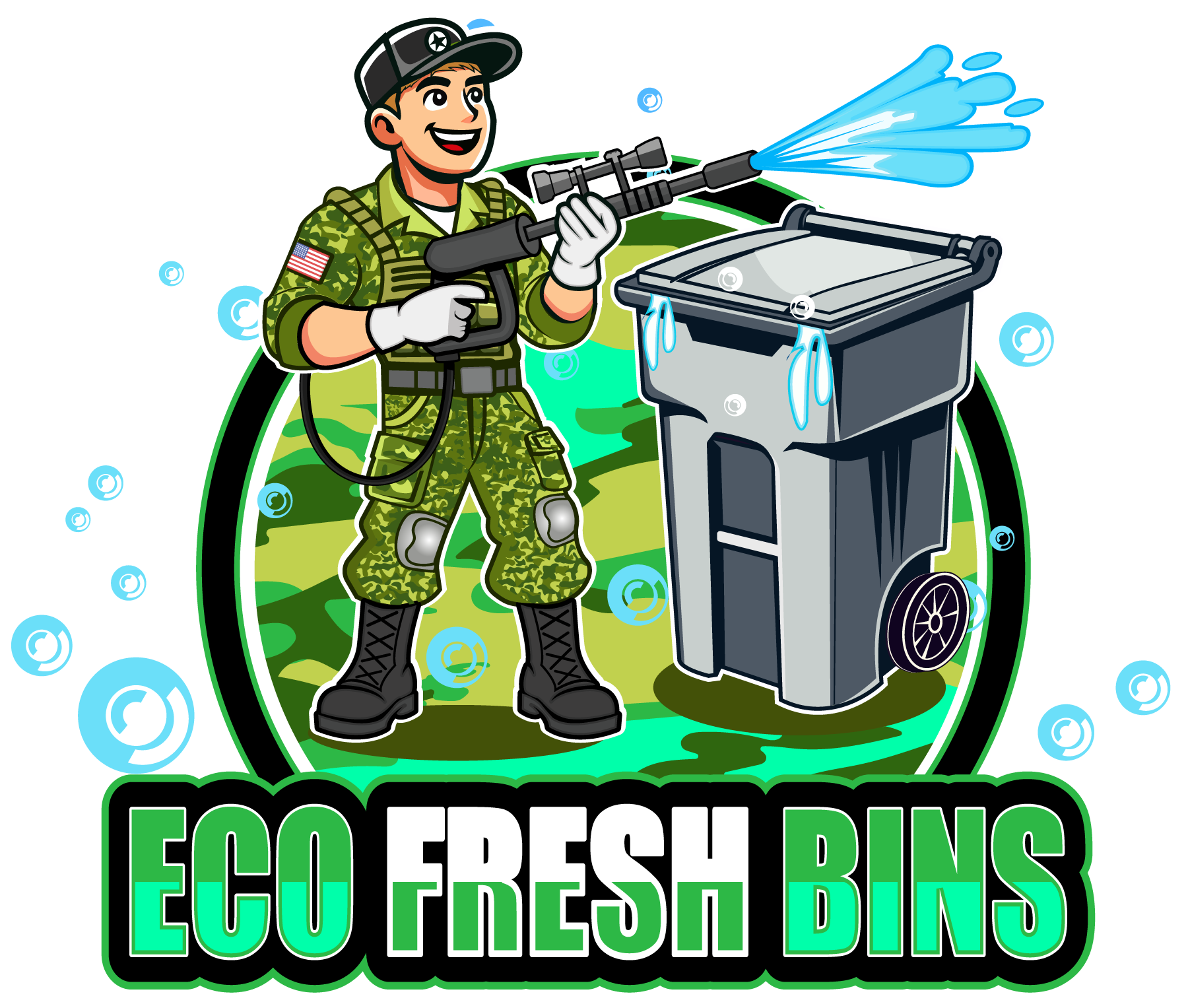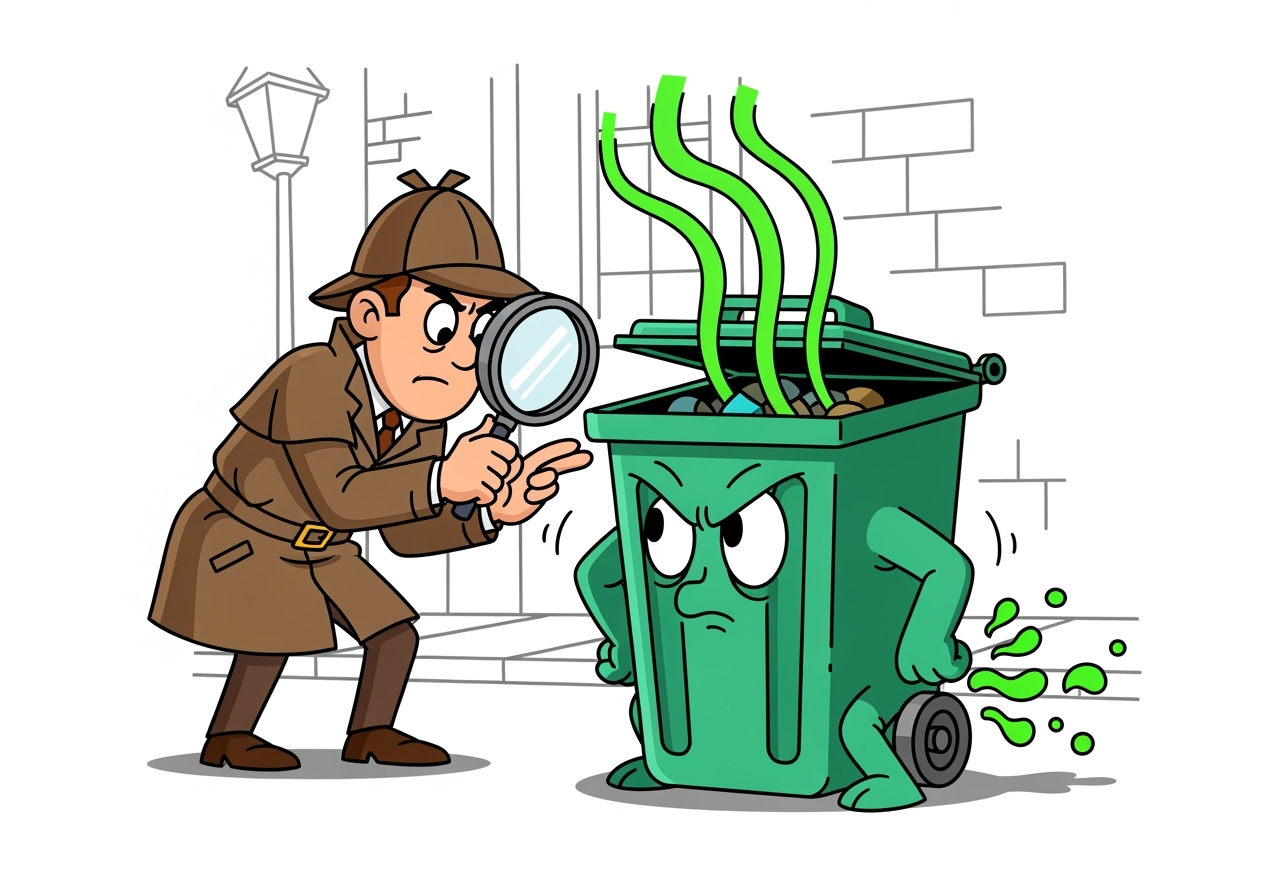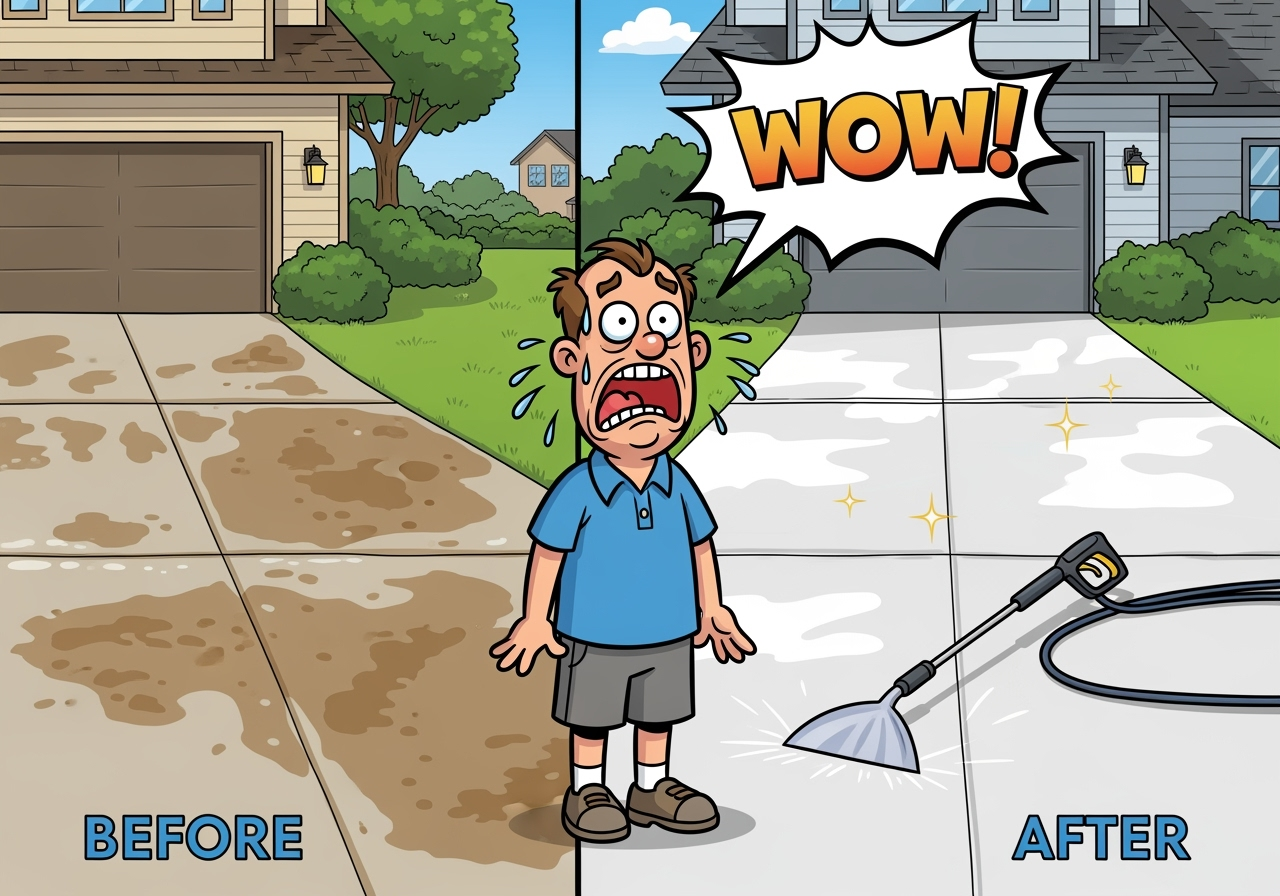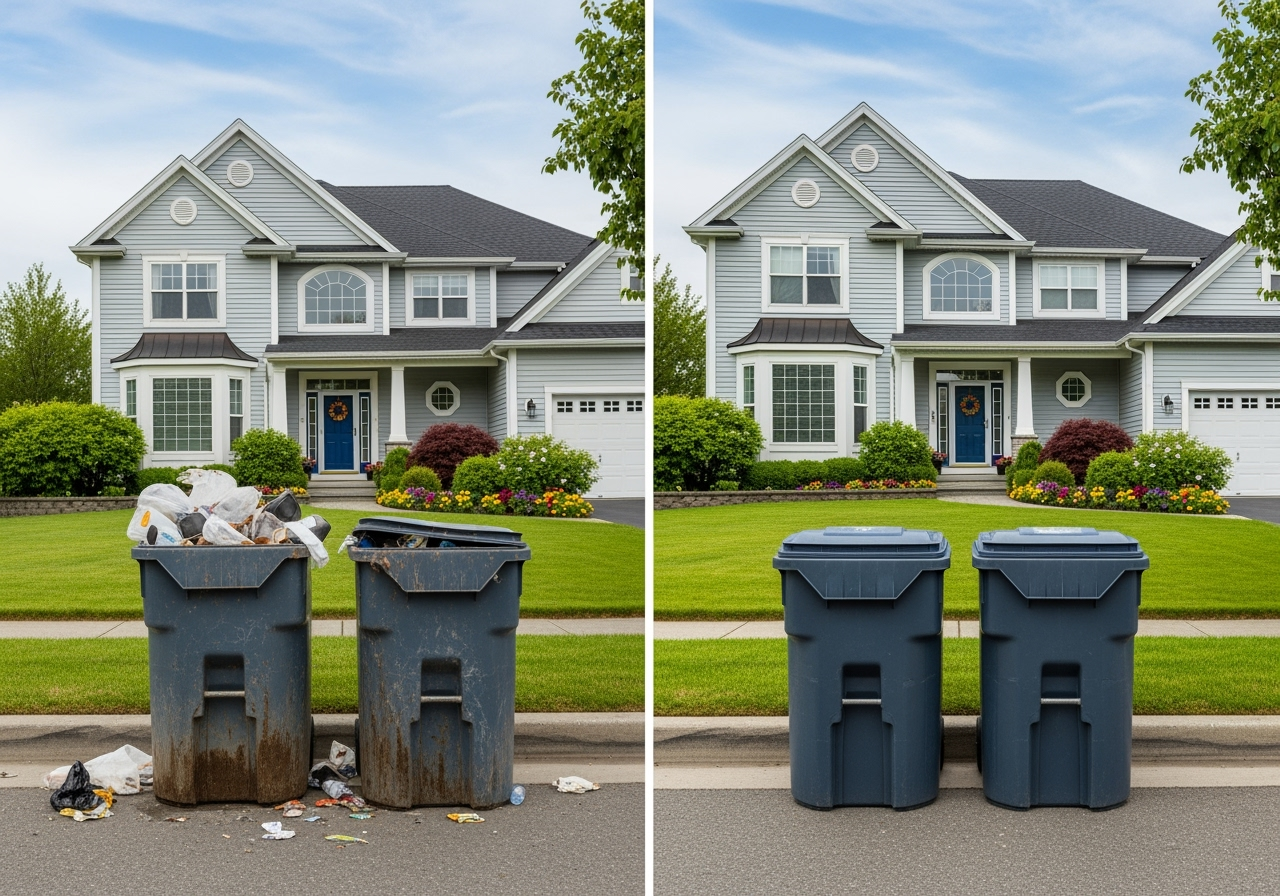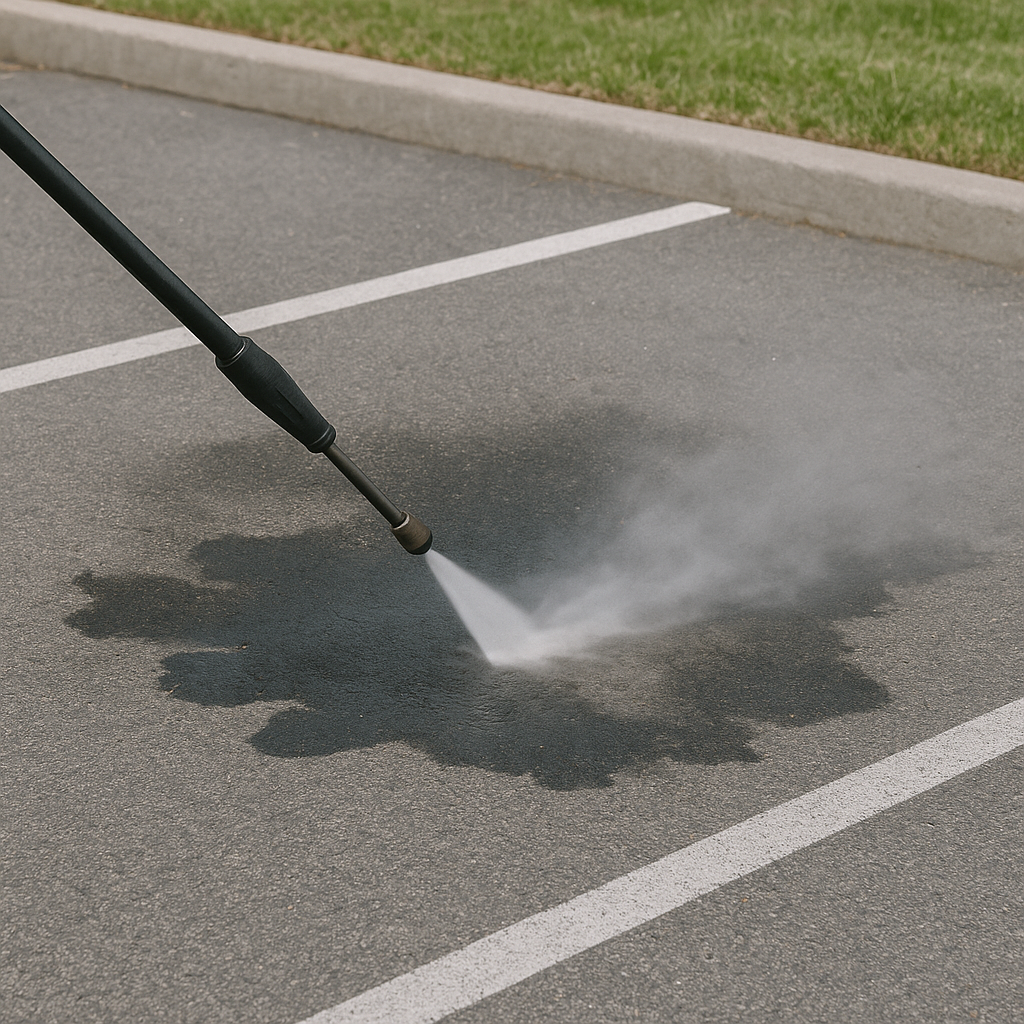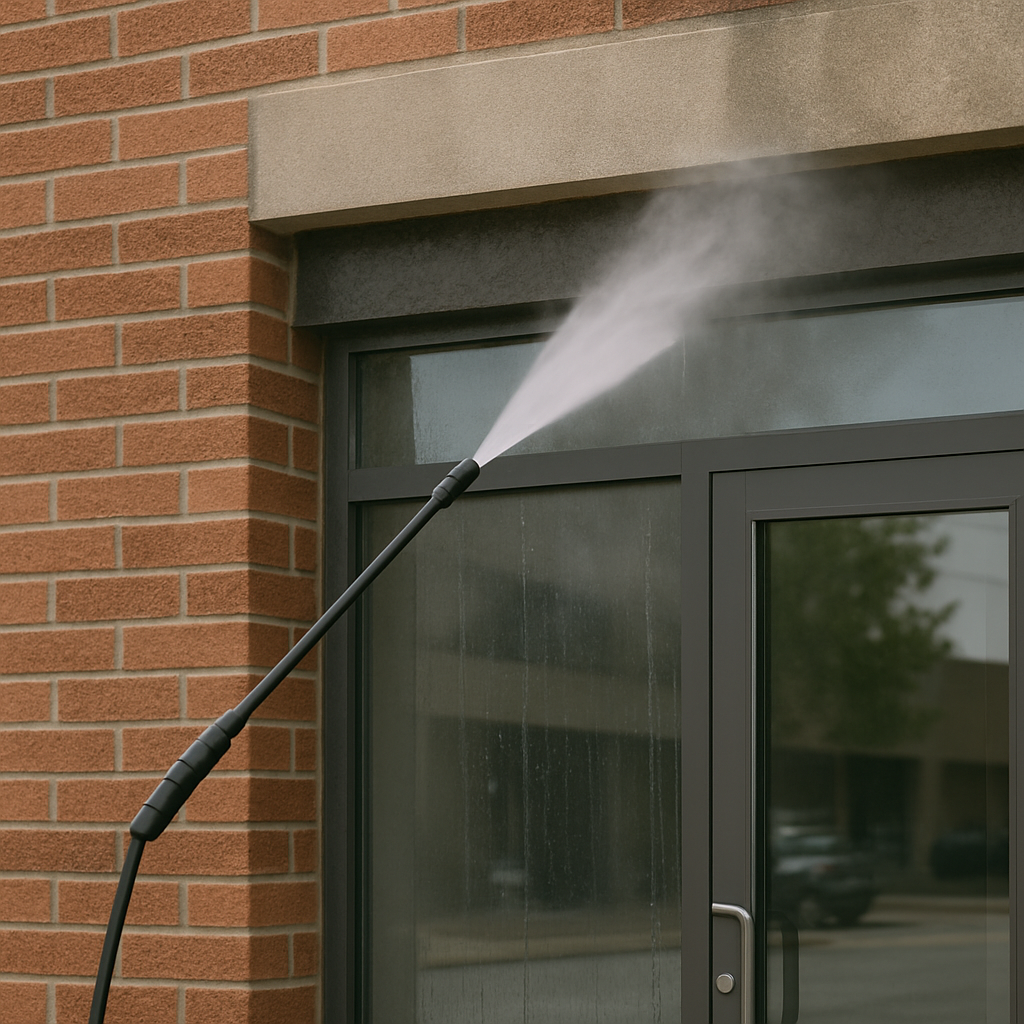Can Power Washing Damage Vinyl Siding? The Straight Answer
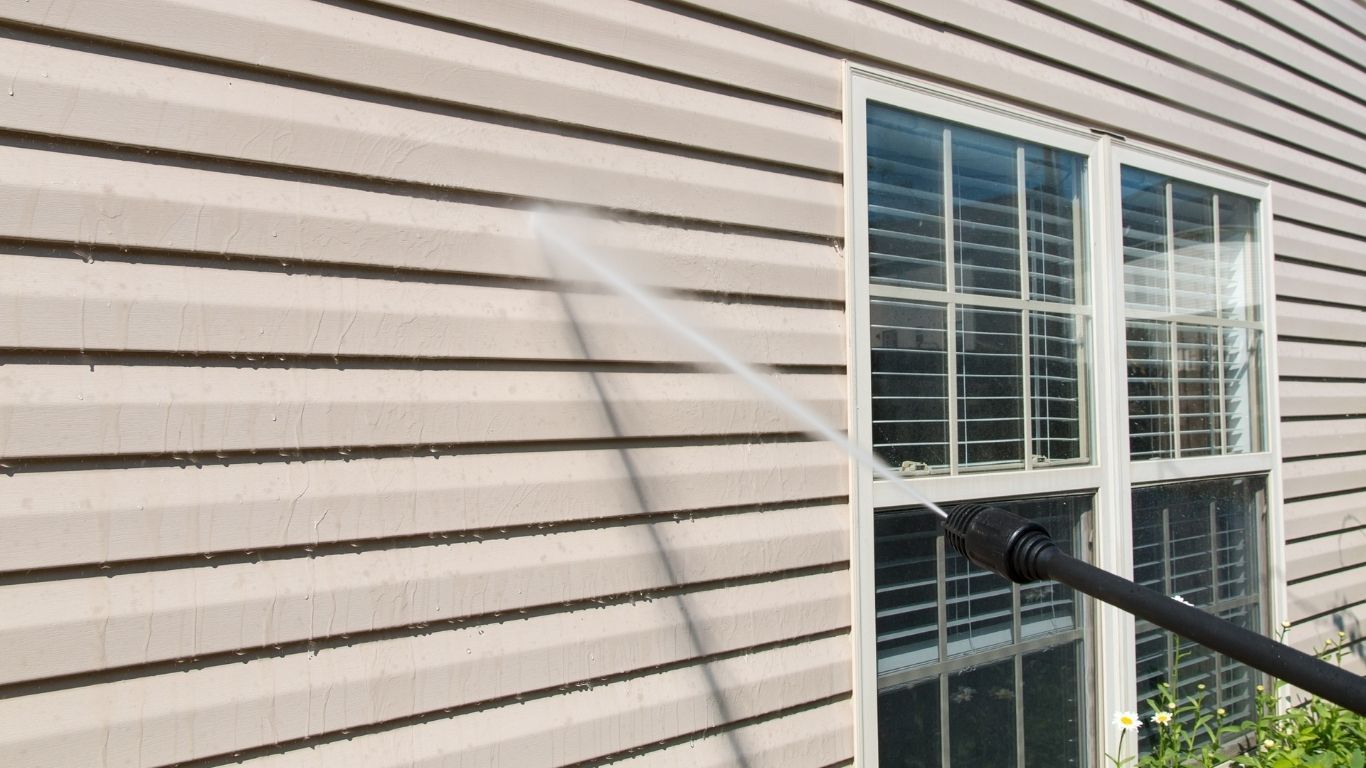
Let’s get right to the point. Yes—residential power washing can damage vinyl siding when high pressure is applied too close, at the wrong angle, or without the right detergent. Water forced behind panels warps insulation, streaks sheathing with mildew, and even voids manufacturer warranties. Using a low‑pressure “soft wash” method, the correct nozzle, and plant‑safe soap removes dirt and algae without cracking panels or driving moisture where it doesn’t belong.
Keep reading to get the detailed rundown on power washing vinyl siding.
Why Some Homeowners End Up With Cracked or Buckled Siding
These are the main reasons why power washing can damage vinyl siding.
Pounds per Square Inch (PSI) Misuse
Consumer machines blast up to 2,000–3,000 PSI, enough to slice through grime, and, unfortunately, plastic and vinyl. Even 1,200 PSI can score vinyl if the spray is concentrated on a single spot.
Wrong Spray Pattern
A zero‑degree tip concentrates all pressure into a pinpoint stream. It’s great for concrete graffiti removal. However, it’s terrible for flexible cladding that relies on interlocking edges to stay weathertight.
Upward Angle Spray
Shooting water upward pushes it under the bottom lip of each panel, creating hidden cavities where moisture lingers and mold forms.
Harsh Chemicals
Chlorine bleach stronger than 1 : 9 can strip UV protectants and fade color. Cheap detergents marketed for decks may be alkaline enough to etch the surface.
Soft Washing vs. Pressure Washing: The Key Difference
Many of our clients ask: “Can you powerwash vinyl siding?” Our answer is “yes.” However, choose soft washing when it comes to cleaning vinyl siding. Here’s why.
- Pressure Washing combines high PSI with heated water. While this is ideal for driveways and brick, it will definitely damage vinyl siding.
- Soft Washing uses specialty detergents to break the bond between organic growth and siding, then rinses at garden‑hose–level pressure (under 300 PSI). Choose this instead when cleaning vinyl siding.
Here’s the takeaway: For vinyl, soft washing is safer, faster, and lasts longer because the soap neutralizes mildew spores instead of just blasting the visible residue.
How to Powerwash Vinyl Siding the Safe Way
Here’s how a professional power washing company performs a safe vinyl cleaning.
Detergent Does the Heavy Lifting
Plant‑based surfactants wrap around pollen, dust, and algae. A mild sodium hypochlorite kicker (under 1 %) sanitizes without bleaching color.
Dwell Time
3-5 minutes lets chemistry loosen the grip of grime. Rushing this step tempts operators to crank up PSI.
Fan‑Spray Nozzle
A 40‑degree tip spreads pressure over a wider area. The stream hits the siding like rain rather than a chisel.
Rinse From Top Down
Gravity carries suds and loosened dirt away from seams, preventing streaks and spotting.
Visible Signs You—or Your Last Contractor—Used Too Much Pressure
Notice any of the following signs? It means your last pressure washing company didn’t know what it was doing.
- White chalky streaks showing exposed vinyl substrate
- Hairline cracks around nail hems
- Warped or rippled panels near hose entry points
- New drafts or musty odors inside exterior walls
- Caulk beads blasted out around windows and doors
If you notice any of these, schedule an inspection before moisture has time to rot sheathing.
DIY vs. Professional Soft Wash: Weighing Your Options
How do you know when to call in the professional residential power washing pros? Consider these factors:
When DIY Works
- Single‑story ranch with easy ladder access
- Light dust or pollen—no established algae
- You own a machine with adjustable pressure and the correct nozzles
When to Call a Pro
- Two‑story homes or steep terrain
- Black “tiger stripes” under gutters or algae streaks on shingles
- Time crunch: Experienced crews finish most houses in two hours, including rinse‑down of plants and windows
Professionals also reclaim run‑off, a must if you’re subject to HOA rules or live near waterways.
EcoSafe Detergents: Cleaning Power Without Garden Guilt
Modern soft‑wash solutions are biodegradable within 72 hours and neutralize upon contact with soil. They leave no salty residue to burn turf or rust aluminum trim. For pollinator beds, techs mist‑wet leaves before and after application—an extra buffer that keeps bees buzzing undisturbed.
People Also Ask
What PSI Is Safe for Vinyl Siding?
Anything under 300 PSI coupled with a wide fan tip. Higher pressure should only touch concrete or brick.
How Often Should Vinyl Siding Be Washed?
Once every 12 months in humid climates, including the Central Virginia area. Six‑month touch‑ups if your home sits under dense tree cover.
Does Soft Washing Void My Siding Warranty?
No. In fact, many manufacturers specify “low‑pressure wash with mild detergent” as the approved maintenance method.
Can I Use Bleach to Clean Mold Off Siding?
Only if diluted below 1 %. Higher concentrations can fade pigment and degrade surface UV protectants.
Will Soft Wash Soap Harm My Pets?
Not when applied correctly. Dogs and cats can return to rinsed, dry areas within 30 minutes.
Beyond Vinyl: Surfaces That Demand Different Pressure
Now that you know the basics of power washing vinyl siding, here’s the rundown on cleaning other surfaces.
- Brick or Block – Up to 3,000 PSI with rotary tip; detergent optional.
- Stucco – Low pressure plus algae‑specific surfactant to avoid etching.
- Cedar Shake – Soft wash with brightener additive to neutralize tannins.
- Composite Decking – 1,000 PSI max; anything stronger raises fibers and voids warranty.
Matching method to material prevents the “Swiss cheese” look that happens when one‑pressure‑fits‑all.
A Seasonal Plan for Gaining Curb Appeal
Here’s our residential pressure washing recommendations based on each season:
Spring: Pollen rinse & gutter tiger‑stripe removal
Summer: Deck cleaning and mildew treatment before sealing
Fall: Driveway pressure washing to clear oil and leaf tannins
Winter Prep: Soft wash siding to remove spores that feed during dormancy
Stick to that rhythm and siding stays bright, paint jobs last years longer, and HVAC units breathe easier.
Final Takeaway: Soft Wash Is the Safe Wash
Power washing can damage vinyl siding—but only when you treat delicate cladding like a concrete driveway. Choose a soft‑wash system that lets detergent, not brute force, do the work. Whether you DIY with caution or hire pros, keep pressure low, spray downward, and give soap a moment to break the bond.
Ready to protect your siding the right way? EcoFresh Bins offers plant‑safe soft washing backed by our Love‑It‑or‑Re‑Clean promise. Book an instant quote to power wash vinyl siding today and give your vinyl the gentle clean it deserves.
